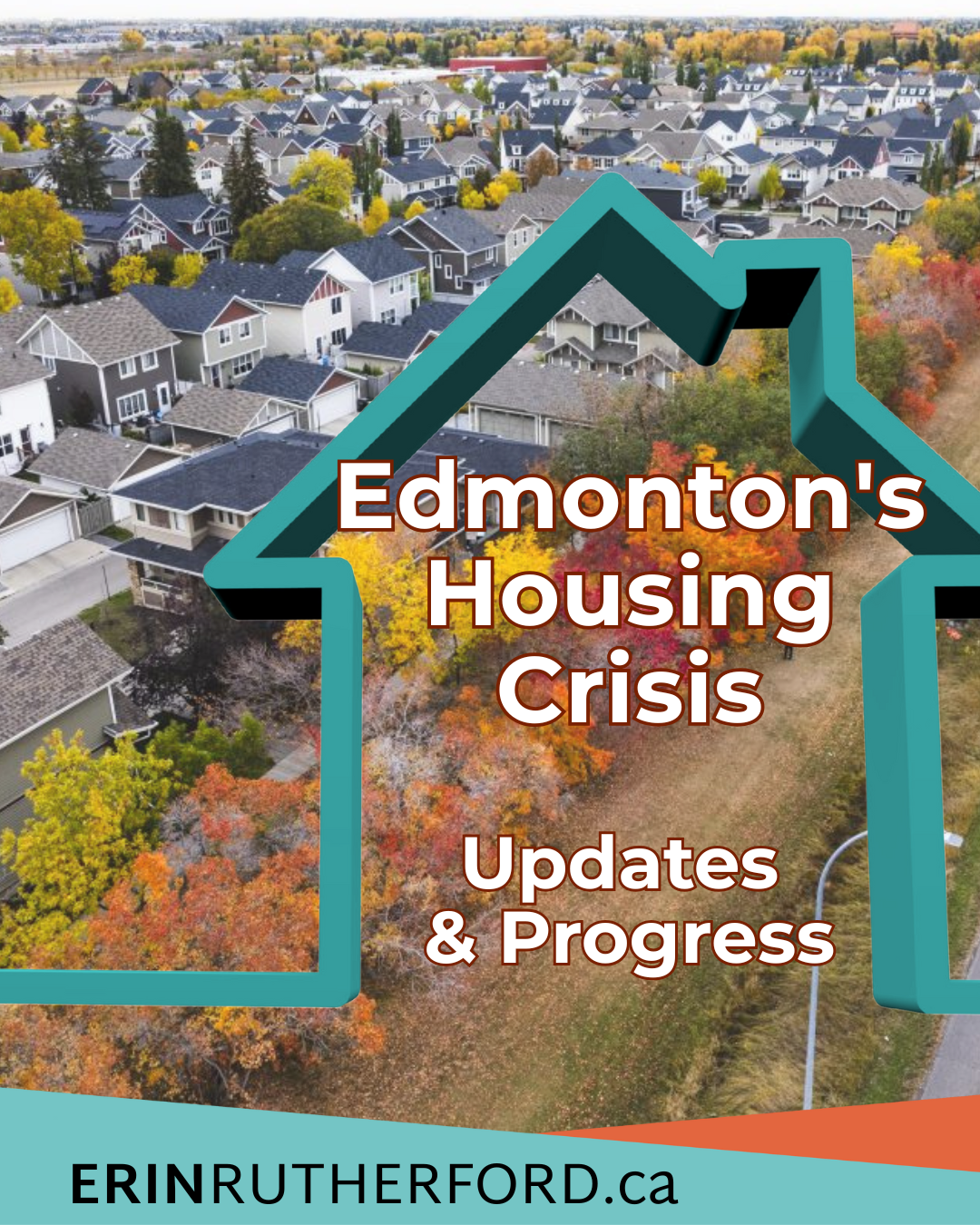Edmonton's Housing Crisis: Updates & Progress
Every Edmontonian deserves safe, affordable, and appropriate housing. Like other major Canadian cities, Edmonton faces a housing crisis, and in January 2024 City Council declared a housing and houselessness emergency.
The City is busy doing everything within municipal jurisdiction to quickly and creatively address this emergency.
1 in 8 households in Edmonton is in Core Housing Need, meaning that their housing is either unaffordable (costs more than 30% of their gross income), unsafe, and/or crowded.
These issues are more likely to affect renters, seniors, folks with disabilities, and female-led households. The City’s Affordable Housing Strategy acknowledges the need for both market affordability, as well as diverse affordable housing options along the housing spectrum.
The increasing number of people experiencing homelessness in Edmonton is devastating. Homeward Trust’s data shows how the total number of provisionally accommodated, unsheltered, and sheltered individuals experiencing homelessness in February 2021 was 1,534. This number steadily rose to 2,241 in 2022, 2,407 in 2023, and 2,976 in 2024. Alarmingly, there was a significant jump to 5,096 in February 2025, indicating a dramatic increase in homelessness.
The City has ramped up efforts to address the housing and houselessness emergency via a variety of avenues. Let’s look at some of the city actions going towards this.
Here’s an overview of some of the actions and results we’re seeing:
Affordable Housing Investment:
The City committed funding and/or land to support 2,879 units, surpassing the original target of 2,700. A new target of 4,652 units was set, including 1,977 renewal units, 320 Permanent Supportive Housing (PSH) units, 149 deep subsidy Indigenous-led units, 171 transitional units, and 2,035 affordable units (up to 80% of market rates).
Through the Fall 2024 Affordable Housing Investment Program (AHIP) intake, City Council approved $19.2 million for 275 new units and 22 rehabilitated units across three affordable housing, three supportive housing, and one transitional housing development. $900,000 from the Housing Accelerator Fund supported 24 affordable housing units.
Indigenous Housing:
The City's Indigenous-led Affordable Housing Investment Grant Streams provided $8.3 million for 93 new units (one transitional, two affordable) for Indigenous people experiencing homelessness, low-income families, and those fleeing domestic violence.
An additional $2.29 million was approved for Métis Capital Housing Corporation to develop 36 units for Indigenous Seniors.
Since 2020, the City has committed to 322 Indigenous-led affordable housing units (384 including market housing).
Supportive Housing Development:
$33.4 million was approved for Canora (63 units, 9 barrier-free) and Garneau (34 units, 5 barrier-free) supportive housing projects.
A City-led supportive housing project in Holyrood received an occupancy permit ahead of schedule, providing 63 studio units (12 barrier-free).
Renewal of Existing Affordable Housing Stock:
$10.5 million from the City and $12.8 million from CMHC are funding the renewal of 882 social housing units.
$3.5 million from the City and $6.75 million from CMHC are funding the renewal of 1,073 near-market rental units.
A total of 1,955 units will be renewed by early 2026.
Community Mobilization Task Force on Housing and Houselessness:
Task Force Recommendations: a Community Fund for Accelerated Retrofits ($1.5 million) to repurpose properties into housing, a Bridge Between Housing Platform ($1 million) to connect social agencies with landlords, and Peer Support Services for Vulnerable Tenants ($1 million) to help tenants maintain housing.
Land Below Market Value:
The City contributed $3.8 million (land below market value) to support E4C (19 transitional units, 51-53 shelter beds) and Jasper Place Wellness Centre (JPWC) (24 units).
Surplus School Sites:
11 surplus school sites are targeted for development, aiming for up to 1,800 new housing units, with 50% being non-market affordable housing.
Policy and Administrative Updates:
Updated Zoning Bylaw, District Plans, and Priority Growth Areas: Promote diverse housing types, increased density, and streamlined development. These changes incentivize housing supply, lower costs, and meet the city's growing population and affordability needs.
Affordable Housing Permit Processing: Development permit applications for non-market affordable housing are prioritized.
Affordable Housing Capacity Building: An Affordable Housing Guidebook was launched, and resources for developers were made available online.
Housing Needs Assessments: Regional and supplemental housing needs assessments were conducted.
Lived Experience Research: Actions were identified based on research and engagements with individuals with lived experience of housing needs.
Policy Reviews: Reviews of affordable housing investment guidelines and extreme weather conditions policies were initiated.
Homelessness and Housing Services Plan:
From March to December 2024, the Housing Relocation team diverted 36 households from homelessness.
385 individuals completed Tenant Empowerment courses across 49 sessions.
There were 67 days of extreme weather activation in 2024, with City coordination resulting in 592 transports to shelter and 432 overnight shelter stays.
What’s next?
While Edmonton continues to be one of Canada’s most affordable major cities in the country, we know that there’s still a lot of work to be done to address the housing crisis in our city. I’m proud to see the progress so far, and the results that will continue to unfold over the next several years — However, we know that housing, houselessness, and affordability continue to be serious issues impacting many Edmontonians.
There isn’t one solution to solving this crisis, but one thing is clear — communities are better off when all orders of government, non-profits, private industry, and more, work together. I welcome you to join the conversation so together we can continue to keep Edmonton affordable and tackle housing and houselessness in Edmonton.
________________________
Check out my previous blogs on the housing crisis in Edmonton:

